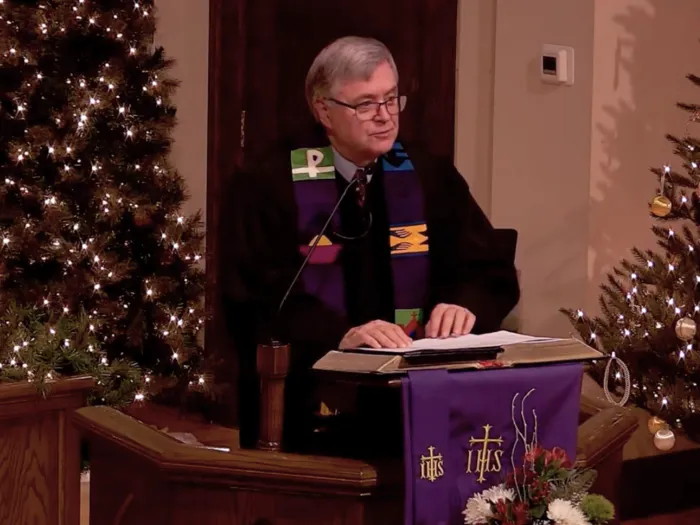A river runs through Anderson Auditorium
This river, a length of fabric placed by young dancers, carried prayers for healing

MONTREAT, North Carolina — People in worship Wednesday at the Presbyterian Association of Musicians’ Worship & Music Conference saw their prayers, which they’d written down on slips of paper, swept away in a river that flowed through Anderson Auditorium at Montreat Conference Center.
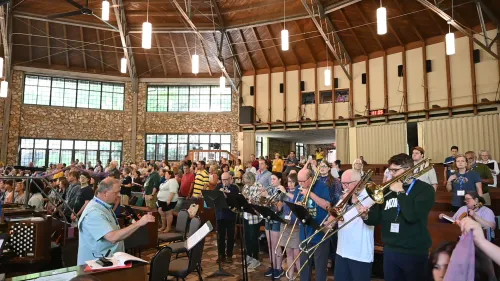
The river was in fact a long length of fabric, brought into the auditorium by a team of mostly young people who danced their way to the front and then deposited the river on the stage. Later in the service, worshipers came forward to place their prayers for healing they’d written down atop the river.
Humility was the theme for worship Wednesday. “Rather than false modesty, the call to clothe ourselves in humility is to realize, demurely, that we are not always the main character in the story,” said conference preacher Dr. Margaret Aymer, Vice President for Academic Affairs at Austin Presbyterian Theological Seminary. “Today’s service celebrates God’s gift of healing and wholeness.”
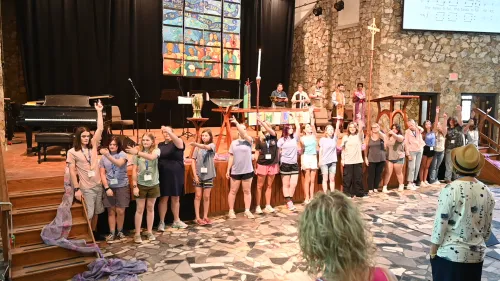
David LaMotte sang “Boots and Gloves,” his reflection on Hurricane Helene and the compassion that rose in response to it. Among the lyrics: “So the river took our shelter and left us in the dark, but the river of compassion hit a higher watermark.”
The dancers brought in the river while the rest of those in worship sang “Shall We Gather at the River.”
During a sermon she based on the account of the healing of Naaman found in 2 Kings 5:1-19a, Aymer said that when “we’re called to clothe ourselves in humility, I don’t believe humiliation is what the Bible has in mind.” It is instead “an invitation to reorientation, to shifting our perspective and changing our actions so we right-size ourselves in relationship with others and God.”
She used a gaming term to explain how to move forward successfully: “You have to be willing to listen to the NPCs.”
An NPC, she explained, is a non-player character. “They are a part of the game, but they’re not the main character. Every player knows sometimes you need to be humble enough to listen to the NPCs.”
In the story about Naaman’s healing, there are two NPCs, “each with lessons in humility to teach our brother Naaman,” she said. The first is the enslaved Israelite girl captured by the Arameans on a raid in Israel who’s then forced to work for Naaman’s wife. We know little about this NPC. “She has no power, no authority, no wealth and no status. She appears once, has one line, and then disappears from our memory,” Aymer said. “She is an NPC, yet the story cannot progress unless Naaman listens to her.”
But Naaman hears only half of what she has to say, namely “cure skin disease” and “Samaria.” He goes to his boss and is sent to the king of Israel. He thus goes as an emissary of a king to a king.
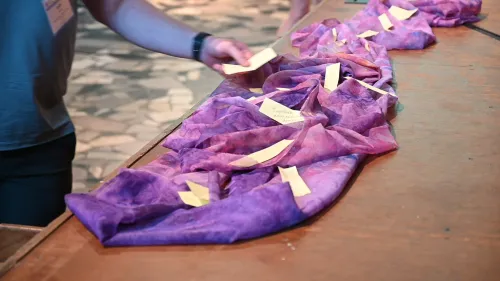
But the king of Israel can no more cure Naaman’s skin disease than the king of Syria could. The enslaved girl said nothing of a payment, but Naaman — rather than showing humility — brings “an exorbitant show of wealth, a sign he is worthy to be cured,” Aymer said, “as though health and wellness belong only to the affluent.”
Naaman is “flummoxed at the prophet’s flat refusal of payment,” Aymer said. The army commander “sees his cure as a war bounty.” He’s “insulted by a prophet who doesn’t even come to the door to speak to him. Naaman still does not have the humility to imagine a posture not of intimidation, but of intercession; not of forceful demands, but of faith petition.”
It is humility that “offers us a chance to look beyond our own status to see every other person as the embodiment of God,” she said, “to see God’s power at work beyond our own imagining, beyond our wealth to see the benevolence and bounty of God, who gives us far more than we can ask or think,” Aymer said. “When we put on humility, we begin to perceive this God-beloved world more fully. We see God is in control and we are not, that God loves us more fully than we could even imagine.”
In the end, Naaman learns to listen to the NPCs. He gets another chance with his own servants, who “challenge Naaman’s lack of imagination, his unwillingness to put down his power and wealth, his disdain for a river he believes is too ordinary to wash his powerful Syrian body.” The servants “challenge his bravado to not do a task any child could do,” she said. They candidly tell Naaman, “All he said to you was wash and be clean.”
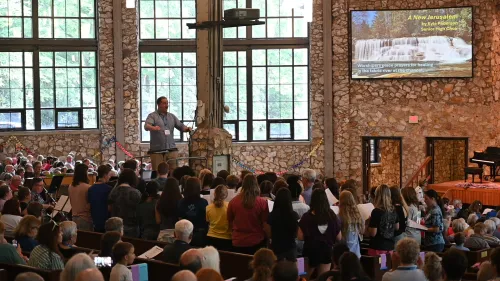
“Friends, we need to listen to those NPCs, the people who cook our meals and clean our rooms. No person is truly an NPC, and we do not always know how God will heal us,” Aymer said. “When we look for heavenly signs, God sends us angels wearing boots and gloves.”
“We may think these divine messengers are NPCs, but the truth is they are the main characters, sent with shawls of humility until we are right-sized, humiliated and able to trust our God once more.”
Those in worship were blessed by the Senior High Choir, which sang Kyle Pederson’s “A New Jerusalem Arise.” During the anthem, worshipers placed their prayers in the river.
You may freely reuse and distribute this article in its entirety for non-commercial purposes in any medium. Please include author attribution, photography credits, and a link to the original article. This work is licensed under a Creative Commons Attribution-NonCommercial-NoDeratives 4.0 International License.



